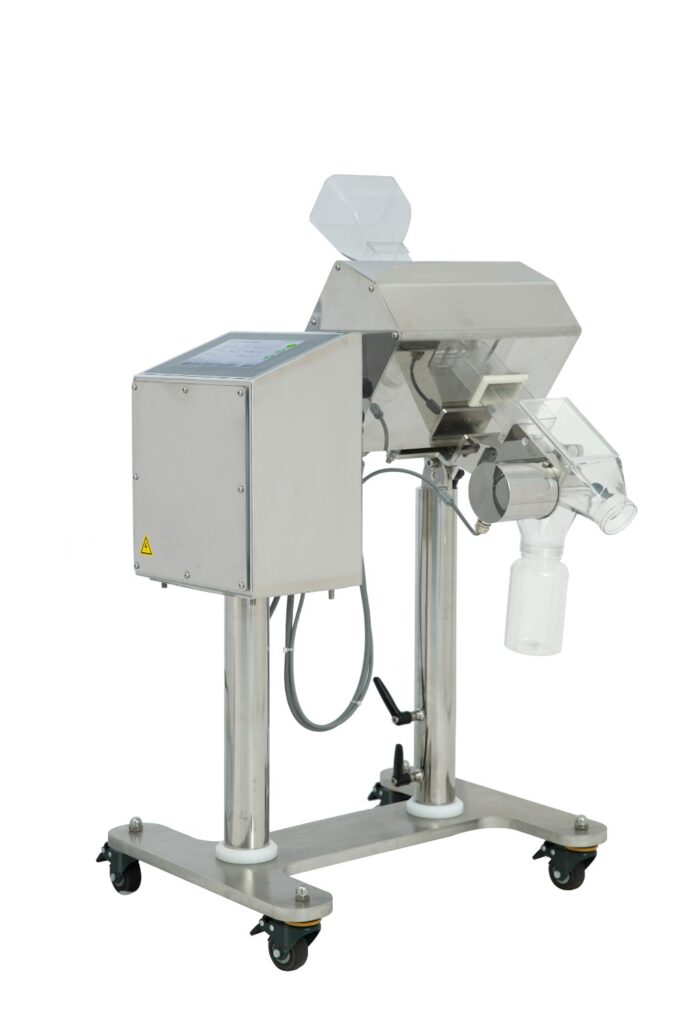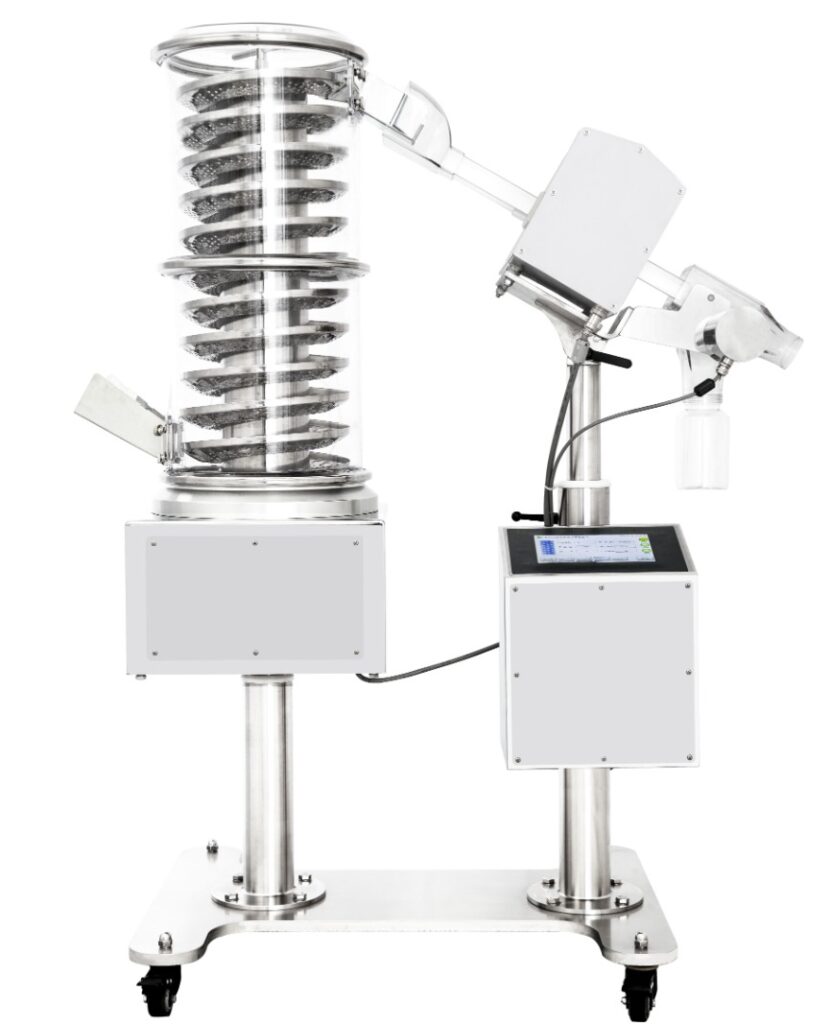W świecie farmaceutycznym małe metalowe odłamki może oznaczać różnicę między życiem a śmiercią. Pill zanieczyszczony metalowymi składnikami może zaszkodzić zdrowiu pacjenta. Obowiązkiem nowoczesnego przemysłu farmaceutycznego jest zapewnienie, aby wszystkie produkowane leki były bezpieczne do spożycia. Każdy lek musi być zgodny z ogólną kontrolą jakości. Obejmuje zapewnienie bezpieczeństwa, czystości i produkcji bez zanieczyszczeń.
Farmaceutyczny detektor metalu to nie tylko zwykłe narzędzie produkcyjne. W wielkim przemyśle farmaceutycznym detektor metalu pomaga wykryć zanieczyszczenia w każdym leku. Nie jest to tylko narzędzie do zapewnienia jakości (QC), ale także niezbędnego obrońcy ludzkiego życia. Dzisiaj, Detektory metalu przekształciły się w niezbędne elementy nowoczesnego bezpieczeństwa farmaceutycznego, zgodności i doskonałości operacyjnej.

Ukryte niebezpieczeństwa: dlaczego dzieje się zanieczyszczenie metali
Fragmenty metali mogą wchodzić w dowolne leki podczas produkcji medycyny. Istnieje kilka przyczyn:
- Z maszynowych zużycia. Stare maszyny produkcyjne mogą zanieczyścić produkowane leki podczas produkcji.
- Zepsuty sprzęt, śruby, ostrza lub luźne części. Metalowe elementy złamanego sprzętu mogą również zanieczyścić lek.
- Zanieczyszczenie surowców od dostawców. Dostawcy mogą dać ci surowce zanieczyszczone podczas produkcji.
Te metalowe zanieczyszczenia są często mikroskopijne. Nie widać ich bezpośrednio. Korzystanie z specjalnego sprzętu jest niezbędne do wykrywania tych metalowych zanieczyszczeń. Będzie ryzyko związane z zanieczyszczoną produkcją medycyny. Po pierwsze, bezpieczeństwo pacjenta może być zagrożone (np. Urazy wewnętrzne lub toksyczność). Po drugie, może to zaszkodzić reputacji i prawnej pozycji producenta.
Nie do wykrycia: Detektory metalu jako opiekunowie zgodności
FDA (USA), UE GMP i WHO (Global) opublikowali swoje wytyczne dotyczące kontroli zanieczyszczenia we współczesnej produkcji Big Pharma. Każdy lek musi być wolny od zanieczyszczeń, zanim został sprzedany dla użytkowników końcowych. W przeciwnym razie Big Pharma może trafić na swoją reputację, a nawet niektóre sankcje, które mogą prowadzić do zamknięcia firmy farmaceutycznej.
Detektory metali mogą pomóc firmom farmaceutycznym spełniać najnowsze wymagania dobrych praktyk produkcyjnych (GMP) i analizy zagrożeń oraz krytycznych punktów kontrolnych (HACCP). Może wykryć drobne fragmenty metali, które wchodzą do każdego produktu medycyny. Mało tego, systemy detektorów metali w nowoczesnym farmaceucie zarejestrowają również swoje wyniki i zamieni je w oficjalne raporty produkcyjne. W ten sposób firmy farmaceutyczne mogą wysłać dzienniki oceny odpowiednim organom regulacyjnym.
Należy pamiętać, że farmaceutyczne wykrywacze metali nie są opcjonalne. Są to obowiązkowe zabezpieczenia w wielu jurysdykcjach, aby pomóc w ochronie zdrowia populacji. Ponadto cechy identyfikowalności i raportowania nowoczesnych systemów detektorów metali będą wspierać audyty i inspekcje przeprowadzone w każdej jurysdykcji.
Rodzaje Detektory metalu Używane w farmacji

Detektory metali w produkcji farmaceutycznej występują w różnych typach. Oto typowe typy:
- Wykrywacze metali tabletu /kapsułki. Firmy farmaceutyczne mogą używać tego typu do sprawdzania zanieczyszczeń w tabletkach lub kapsułkach.
- Detektory rurociągów. Sprzęt ten służy do sprawdzania zanieczyszczeń w lekach syropowych lub płynnych.
- Detektory pasz grawitacyjnych. W przypadku proszków i granulów sprzęt ten jest niezbędny do sprawdzenia zanieczyszczeń metali.
Farmaceutyczne wykrywacze metali są również wyposażone w zaawansowaną technologię do najdokładniejszego wykrywania. Po pierwsze, detektory wysokiej wrażliwości pomogą wykryć różne zanieczyszczenia metali, takie jak cząstki żelazne, nieżelazne i stali nierdzewnej. Po drugie, wykryte zanieczyszczone produkty zostaną automatycznie odrzucone przy użyciu automatycznych systemów odrzucania.
Modern Pharma Production System zintegruje wykrywacze metali z automatyzacją, rejestrowaniem danych i monitorowaniem w czasie rzeczywistym.
Wydajność, oszczędności kosztów i zaufanie marki
Wczesne wykrywanie zanieczyszczeń metali może pomóc firmom farmaceutycznym w zapobieganiu dużym ryzyku, jak na przykład:
- Ogromne wycofania. Masowe wycofania mogą się zdarzyć, gdy organy regulacyjne stwierdzają, że produkty medyczne zawierają zanieczyszczenia, które są szkodliwe dla zdrowia ludzkiego. Wszystkie rozproszone produkty farmaceutyczne muszą zostać odwołane i ponownie ocenione.
- Strata finansowa. Masowe wycofania mogą powodować duże straty finansowe dla firmy. Oznacza to, że firma nie może już sprzedawać produktów medycznych, co obniży ich zyski.
- Kary regulacyjne. Poza tym organy regulacyjne zastosują również karę dla firm farmaceutycznych, które miały zanieczyszczone produkty. Może to przejść od płacenia grzywien, stawiania czoła problemom prawnym, a także zamknięciu firmy farmaceutycznej.
Zastosowanie farmaceutycznych wykrywaczy metali może również pomóc firmom medycznym o oszczędzaniu ich wydatków od skróconych przestojów i mniejszej ilości marnotrawstwa produktów. Ten sprzęt może pomóc w promowaniu czystego środowiska produktu. Pomoże to podnieść zaufanie konsumentów i lojalność wobec marki - kluczowe korzyści w nasyconej branży. Wzmocni znaczenie spójności i bezpieczeństwa leków ratujących życie.
Pillar of the Future: Obejmowanie proaktywnego bezpieczeństwa
Przyszłość przemysłu farmaceutycznego będzie jaśniejsza dzięki ogromnemu i obowiązkowemu wykorzystaniu detektorów metali farmaceutycznych na całym świecie. Ma to przyjąć proaktywne bezpieczeństwo zdrowia publicznego. Detektory metali w produkcji farmaceutycznej mają również wiele nowych funkcji na przestrzeni lat, integrując nowoczesne zastosowania technologiczne.
- Konserwacja predykcyjna. Pozwala wykryć sprzęt produkcyjny, który wymaga natychmiastowej konserwacji. Pomaga zapobiegać uszkodzeniu maszyn przed zanieczyszczeniem produktów końcowych.
- Detektory napędzane przez AI. Współczesne detektory używają sztucznej inteligencji do wykrywania różnych rodzajów zanieczyszczeń. Jest znacznie dokładniejszy i zaawansowany niż zwykła maszyna do wykrywania.
- Integracja inteligentnej fabryki. Możesz także zintegrować maszynę wykrywalną z innymi inteligentnymi urządzeniami w swojej linii produkcyjnej. Pomoże zautomatyzować proces i stworzyć lepsze oceny dla każdego produktu medycyny.
Detektory metalu ewoluują, aby stać się częścią holistycznych ekosystemów jakości, a nie tylko samodzielne narzędzia. Staje się to istotną częścią zdrowszego systemu produktów produktów medycznych. Producenci mogą postrzegać wykrywanie metalu jako inwestycję, a nie tylko pola zgodności do zaznaczenia.
Wniosek
Detektory metali to niewidoczni bohaterowie bezpieczeństwa farmaceutycznego. Bez tego sprzętu leki mogą zostać zanieczyszczone i śmiertelne, gdy są spożywane. Wykroczenie poza podstawową kontrolą jakości nie jest tylko mądre–Jest to moralny obowiązek w tym krytycznym życiu. Zatem każdy producent musi przestrzegać wymagań dotyczących stosowania detektorów metali w swoich liniach produkcyjnych medycyny.
W miarę ewolucji Pharma również należy jej zaangażowanie w niewidzialną, ale potężną obronę, taką jak systemy wykrywania metali. Zabierze całą branżę farmaceutyczną do znacznie lepszej przyszłości.

